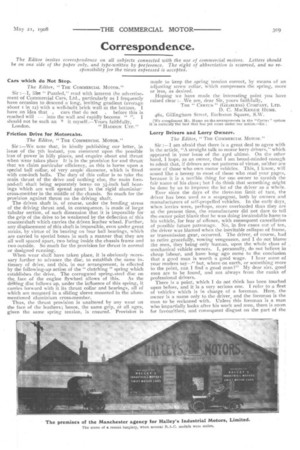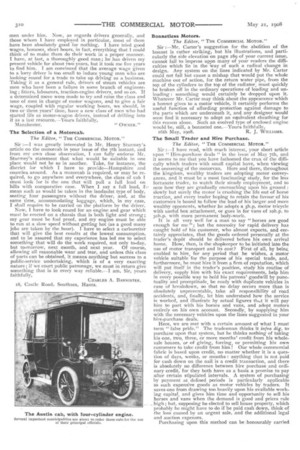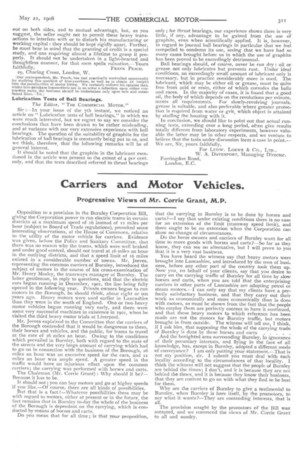Correspondence.
Page 17

Page 18

Page 19

If you've noticed an error in this article please click here to report it so we can fix it.
The Editor invites correspondence on all subjects connected with the use of commercial motors. Letters should be on one side of the paper only, and type-written by preference. The right of abbreviation is reserved, and no responsibility for the views expressed is accepted.
Cars which do Not Stop.
The Editor, " THE COMMERCIAL MOTOR."
Sir :—I, like " Puzzled," read with interest the advertisement of Commercial Cars, Ltd., particularly as I frequently have occasion to descend a long, inviting gradient (average about a in 12) with a well-built brick wall at the bottom. I have an idea that , cars that do not . before this is reached will -into the wall and rapidly become " should not be such an * it myself.—Yours faithfully,
London. " HADDON LIEF."
Friction Drive for /4Iotorcabs.
The Editor, "THE COMMERCIAL MOTOR."
Sir :—We note that, in kindly publishing our letter, in issue of the 7th instant, you comMent upon the possible loss of power in hilly places, and enquire about end thrust when wear takes place It is in the provision for end thrust that we claim particular efficiency, as this is borne upon a special ball collar, of very ample diameter, which is fitted with one-inch balls. The duty of this collar is to take the main thrust of the drive and nothing else, the main foreand-aft shaft being separately borne on 3..inch ball bearings Which are well spread apart in the rigid alurniniurcross-mennber in the middle of the chassis. So much for the provision against thrust on the driving shaft.
The driven shaft is, of course, under the bending stress of the driving thrust and, in consequence, is made of large tubular section, of such dimension that it is impossible for the grip of the drive to be weakened by the deflection of this countershaft which carries the driven leather wheel. Further, any displacement of this shaft is impossible, even under great strain, by virtue of its bearing on four ball bearings, which are carried in special boxes in such a manner that they are all well spaced apart, two being inside the chassis frame and two outside. So much for the provision for thrust in normal or designed running.
When wear shall have taken place, it is obviously necessary further to advance the disc, to establish the same intimacy of drive, and this, in our arrangement, is effected by the following-up action of the " clutching " spring which establishes the drive. The corrugated spring-steel disc on
the face of the engine flywheel allows of this As the driving disc follows up, under the influence of this spring, it carries forward with it its thrust collar and bearings, all of which are mounted in a sliding sleeve mounted in the aforementioned aluminium cross-member.
Thus, the thrust provision is unaltered by any wear on the face of the leathers; hence, the same grip, at all ages, given the same spring tension, is ensured. Provision is
made to keep the .spring 'tension correct, by means of an adjusting screw collar, which compresses the spring, snore or less, as desired.
Hoping we have made the interesting point you have raised clear :-• •We are, dear Sir, yours faithfully,
TEE " CERTLTS (GEARLESS) COMPANY, LTD. D. C. MACKENZIE HOME.
48a, Gillingham Street, Eceleston Square, S.W.
[We alIngliment Me. HLTIDIR on the arrangements in the "Certin " system II is certainly the best that has yet come under our notiee.—End
Lorry Drivers and Lorry Owners.
The Editor, " THE COMMERCIAL MOTOR."
Sir :—I am afraid that there is a great deal to agree with in the article, "A straight talk to motor lorry drivers," which appeared in your issue of the 23rd ultimo. On the other hand, I hope, as an owner, that I am broad-minded enough to admit that, if drivers are not patterns of virtue, neither are some of those who own motor vehicles. This, I know, will sound like a heresy to most of those who read your pages, because it is a terrible thing for one owner to tarnish the fair name of his class ; but 1 do think that something might be done by us to improve the lot of the driver as a whole. Ever since the days of the three-ton limit of tare, the driver has been used as a scapegoat, both by owners and manufacturers of self-propelled vehicles. In the early days, when lorries were, perhaps, more overloaded than they are at the present time, the manufacturer did not dare to tell the owner point blank that he was doing incalculable harm to his vehicle, for fear of offence, with consequent cancellation of possible future patronage. No, in five cases out of ten, the driver was blamed when the inevitable collapse of frame, or transmission gear, occurred. The driver, of course, had to retire gracefully, vowing vengeance, and I do not blame the men, they being only human, upon the whole class of mechanical vehicle owners. I, personally, do not believe in cheap labour, and have long ago come to the conclusion that a good man is worth a good wage. I hear some of your readers say—" but, where on earth, or something more to the point, can I find a good man?" My dear sirs, good men are to be found, and not always from the ranks of professional drivers. There is a point, which I do not -think has been touched upon before, and it is a very serious one. I refer to a fleet of vehicles which is in charge of a foreman. Here, the owner is a name only to the driver, and the foreman is the man to be reckoned with. Unless this foreman is a man who impartially looks after his work and men, there is room for favouritism, and consequent disgust on the part of the men under him. Now, as regards drivers generally, and those whom I have employed in particular, most of them have been absolutely good for nothing. I have tried good wages, bonuses, short hours, in fact, everything that I could think of to make them do their work in a proper manner. I have, at last, a thoroughly good man ; he has driven my present vehicle for about two years, but it took me five years to find him. I am convinced that the average wage given to a lorry driver is too small to induce young men who are looking round for a trade to take up driving as a business. Taking it as a general rule, drivers of steam vehicles are men who have been a failure in some branch of engineering; fitters, labourers, traction-engine drivers, and so on. If a determined move were made to try and raise the class and tone of men in charge of motor wagons, and to give a fair wage, coupled with regular working hours, we should, in two or three years' time, have a new class of men who had started life as motor-wagon drivers, instead of drifting into it as a last resource.—Yours faithfully, Manchester. " OWNER."
The Selection of a Motorcab.
The Editor, "THE COMMERCIAL MOTOR."
Sir :—I was greatly interested in Mr. Henry Sturmey's article on the motorcab in your issue of the 7th instant, and from my own close observation, I can fully endorse Mr. Sturmey's statement that what would be suitable in one place would not be so in another. Take, for instance, the district for which I have to provide—Hampshire and counties around. As a motorcab is required, or may be required, to go anywhere and everywhere, the class of cab I must look for is the one that will pull a full load on hills with comparative ease. When I say a full load, I,. mean such as would be taken in the landaulet type of body, seating four passengers without the driver, and, at the same time, accommodating luggage, which, in my case, I shall require to be carried on the platform by the driver.
Now, I have to look round for an engine and gear which must be erected on a chassis that is both light and strong; my gear must be fool proof, and my engine must be able to run at a slow speed without getting hot (as a good many jobs are taken by the hour). I have to select a carburetter that will give the best results at the lowest consumption, and to be assured that my experience has led me to select something that will do the work required, not only to-day, but to-morrow, next month, and next year. Of course, allowing all reasonable wear and tear, and unless this class of parts can be obtained, it means anything but success to a public-service undertaking, which is of a very exacting nature; if we court public patronage, we must in return give something that is in every way reliable.—I am, Sir, yours faithfully, CHARLES A. BANNISTER.
18, Castle Road, Southsea, Hants. Bonnetless Motors.
The Editor, "THE COMMERCIAL MOTOR."
Sir ;—Mr. Carter's suggestion for the abolition of the bonnet is rather striking, but his illustrations, and particularly the side elevation on page 289 of your current issue, cannot fail to impress upon many of your readers the difficulties which lie in the way of such a radical change in design. Any system on the lines indicated by Mr. Carter could not fail but cause a mishap that would put the whole machine out of action, for the return water pipe, from the top of the cylinders to the top of the radiator, must quickly be broken off in the ordinary operations of loading and unloading : something would certainly be dropped upon rt. Whatever Mr. Carter may think about the appearance which a bonnet gives to a motor vehicle, it certainly performs the useful function of affording protection against damage to the parts which are underneath it, and any designer would soon find it necessary to adopt an equivalent sheathing for this reason alone. Such an evolved type of enclosed engine would be, still, a bonneted one.—Yours faithfully, tali May, 19(38. R. J. WILLIAMS.
The Small Trader and Hire Purchase.
The Editor, " THE COMMERCIAL MOTOR."
Sir have read, with much interest, your short article upon " Hire-purchase deals " in the issue of May 7th, and it seems to me that you have fathomed the crux of the difficulty which traders with small capital have, when viewing the oncoming of the motorvan. Here and there, throughout the kingdom, wealthy traders are adopting motor conveyances, and it must be a most fascinating study, for the less fortunate trader, to watch their steady employment, and to note how they are gradually encroaching upon his ground : slowly but surely the motor is crushing the life out of horse traction, and every trader hoping to retain the favour of his customers is bound to follow the lead of his larger and more wealthy opponents, whether he adopts a 5h.p. motor tricycle with useful box attachment, or goes in for vans of toh.p. to 3oh.p. with more permanent body-work.
It is all very well for a man to say "horses are good enough for me "; but the necessity for rapid delivery has caught hold of his customer, who almost expects, and certainly appreciates, that the goods ordered personally at the trader's depot should be delivered before his own arrival home. How, then, is the shopkeeper to be initiated into the use of motor transport and its cost? First of all, by being enabled to hire, for any period that he wishes, a motor vehicle suitable for the purpose of his special trade, and, furthermore, he must hire it from a firm of reputation, which will put itself in the trader's position, study his routine of delivery, supply him with his exact requirements, help him in every possible way to hold his patrons' goodwill by punctuality and promptitude, be ready with duplicate vehicles in case of breakdown, so that no delay occurs more than is absolutely unpreventable, take all responsibility of road accidents, and, finally, let him understand how the service is worked, and illustrate by actual figures that it will pay him to part with his horses and vans, and adopt motors entirely on his own account. Secondly, by supplying him with the necessary vehicles upon the lines suggested in your hire-purchase deals.
Here, we are met with a certain amount of what I must term "false pride." The tradesman thinks it infra dig. to purchase upon that system, but he thinks nothing of taking his one, two, three, or more months' credit from his wholesale houses, or of giving, forcing, or permitting his own customers to take credit from him ! Our whole commercial fabric is based upon credit, no matter whether it is a question of days, weeks, or months : anything that is not paid for cash down on the nail is a credit transaction, and there is absolutely no difference between hire purchase and ordinary credit, for they both have as a basis a promise to pay after certain stipulated intervals. A system of purchasing by payment at defined periods is particularly applicable to such expensive goods as motor vehicles by traders. It saves one from drawing too heavily upon his available working capital, and gives him time and opportunity to sell his horses and vans when the demand is good and prices rule _ high ; but, supposing he elected to sell house property, which probably he might have to do if he paid cash down, think of the loss caused by an urgent sale, and the additional legal and auction expenses.
Purchasing upon this method can be honourably carried out on both sides, and to mutual advantage, but, as you suggest, the seller ought not to permit these heavy transactions to interfere with or to disturb his manufacturing or working capital; they should be kept rigidly apart. Further, he must bear in mind that the granting of credit is a special study, and one requiring almost a lifetime to grasp it properly. It should not be undertaken in a light-hearted and thoughtless manner, for that soon spells ruination.—Yours
faithfully, FRANK PEACH. 29, Charing Cross, London, W.
[Our correspondent, Mr. Peach, has had practically unrivalled opportunity for studying this question of hire-purchase, as well as to obtain an insight into the peculiarities of motor hiring. We certainly endorse his opinion that, whilst hire-purchase transactions are in no sense a reflection upon either contracting party, the business should he undertaken only upon safe and established lines.—En.
Lubrication Tests of Ball Bearings.
The Editor, "THE COMMERCIAL MOTOR."
Sir :—In your issue of the 7th instant, we noticed an article on " Lubrication tests of ball bearings," in which we were much interested, but we regret to say we consider the conclusions that have been drawn to be rather misleading, and at variance with our very extensive experience with ball bearings. The question of the suitability of graphite for the lubrication of ball bearings is constantly being put to us, and we think, therefore, that the following remarks will be of general interest.
It should be noted that the graphite in the lubricant mentioned in the article was present to the extent of 4 per cent. only, and that the tests described referred to thrust bearings only ; for thrust bearings, our experience shows there is very little, if any, advantage to be gained from the use of graphite, even when scientifically applied. It is, however, in regard to journal ball bearings in particular that we feel compelled to condemn its use, seeing that we have had so many cases brought before us in which the use of graphite has been proved to be exceedingly detrimental.
Ball bearings should, of course, never be run dry : oil or grease not only lubricates but prevents rust. Under ideal conditions, an exceedingly small amount of lubricant only is necessary, but in practice considerably more is used. The lubricant, which may be either oil or grease, must be quite free from acid or resin, either of which corrodes the balls and races. In the majority of cases, it is found that a good oil, the body of which depends on the revolutions per minute, meets all requirements. For slowly-revolving journals, grease is suitable, and also preferable where greater protection is required from water or grit, which object is attained by stuffing the housing with it. In conclusion, we should like to point out that actual running tests, extending over a long period, often give results totally different from laboratory experiments, however valuable the latter may be in other respects, and we venture to believe that the tests under discussion form a case in point.— We are, Sir, yours faithfully, For LTJDW. LOEWE & CO., LTD., W. A. DAVENPORT, Managing Director. Farringdon Road, London, E.C.






















